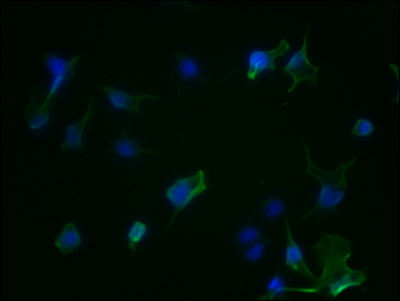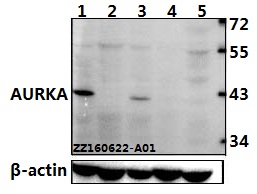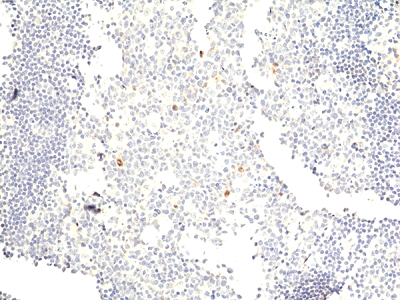
Immunofluorescence staining of Hela Cells with CSB-RA223479A0HU at 1:50, counter-stained with DAPI. The cells were fixed in 4% formaldehyde, permeated by 0.2% TritonX-100, and blocked in 10% normal Goat Serum. The cells were then incubated with the antibody overnight at 4°C. Nuclear DNA was labeled in blue with DAPI. The secondary antibody was FITC-conjugated AffiniPure Goat Anti-Rabbit IgG (H+L).
AURKA Recombinant Monoclonal Antibody
CSB-RA223479A0HU
ApplicationsImmunoFluorescence, ELISA
Product group Antibodies
ReactivityHuman
TargetAURKA
Overview
- SupplierCusabio
- Product NameAURKA Recombinant Monoclonal Antibody
- Delivery Days Customer20
- ApplicationsImmunoFluorescence, ELISA
- CertificationResearch Use Only
- ClonalityMonoclonal
- Clone ID1H8
- ConjugateUnconjugated
- Gene ID6790
- Target nameAURKA
- Target descriptionaurora kinase A
- Target synonymsAIK, ARK1, AURA, BTAK, PPP1R47, STK15, STK6, STK7, aurora kinase A, aurora 2, aurora/IPL1-like kinase, aurora/IPL1-related kinase 1, breast tumor-amplified kinase, protein phosphatase 1, regulatory subunit 47, serine/threonine protein kinase 15, serine/threonine-protein kinase 6, serine/threonine-protein kinase aurora-A
- IsotypeIgG
- Protein IDO14965
- Protein NameAurora kinase A
- Scientific DescriptionMitotic serine/threonine kinase that contributes to the regulation of cell cycle progression. Associates with the centrosome and the spindle microtubules during mitosis and plays a critical role in various mitotic events including the establishment of mitotic spindle, centrosome duplication, centrosome separation as well as maturation, chromosomal alignment, spindle assembly checkpoint, and cytokinesis. Required for initial activation of CDK1 at centrosomes. Phosphorylates numerous target proteins, including ARHGEF2, BORA, BRCA1, CDC25B, DLGP5, HDAC6, KIF2A, LATS2, NDEL1, PARD3, PPP1R2, PLK1, RASSF1, TACC3, p53/TP53 and TPX2. Regulates KIF2A tubulin depolymerase activity. Required for normal axon formation. Plays a role in microtubule remodeling during neurite extension. Important for microtubule formation and/or stabilization. Also acts as a key regulatory component of the p53/TP53 pathway, and particularly the checkpoint-response pathways critical for oncogenic transformation of cells, by phosphorylating and stabilizing p53/TP53. Phosphorylates its own inhibitors, the protein phosphatase type 1 (PP1) isoforms, to inhibit their activity. Necessary for proper cilia disassembly prior to mitosis.
- ReactivityHuman
- Storage Instruction-20°C or -80°C
- UNSPSC41116161


![Aurora A antibody [C3], C-term detects Aurora A protein at spindle by immunofluorescent analysis. Sample: HeLa cells were fixed in ice-cold MeOH for 5 min. Green: Aurora A stained by Aurora A antibody [C3], C-term (GTX104620) diluted at 1:500. Red: alpha Tubulin, a cytoskeleton marker, stained by alpha Tubulin antibody [GT114] (GTX628802) diluted at 1:500. Blue: Hoechst 33342 staining.](https://www.genetex.com/upload/website/prouct_img/normal/GTX104620/GTX104620_43033_20180110_ICC_IF_w_23060120_926.webp)




